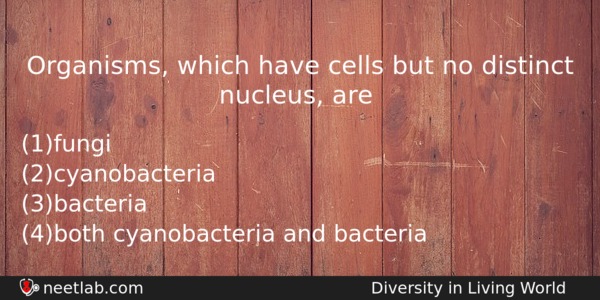| ⇦ | 
| ⇨ |
Organisms, which have cells but no distinct nucleus, are
Options
(a) fungi
(b) cyanobacteria
(c) bacteria
(d) both cyanobacteria and bacteria
Correct Answer:
both cyanobacteria and bacteria
Explanation:
Prokaryotes are cells that have no distinct nucleus. Most prokaryotic organisms are single-celled, such as bacteria and algae.
Related Questions: - Mosses and ferns are found in moist and shady places because both
- Which one of the following scientists name is correctly matched with the theory
- EMP can produce a total of
- The presence of feathers and power of flight are the characteristic features of
- The first step in dark reaction of photosynthesis is
Topics: Diversity In Living World
(339)
Subject: Biology
(4253)
Important MCQs Based on Medical Entrance Examinations To Improve Your NEET Score
- Mosses and ferns are found in moist and shady places because both
- Which one of the following scientists name is correctly matched with the theory
- EMP can produce a total of
- The presence of feathers and power of flight are the characteristic features of
- The first step in dark reaction of photosynthesis is
Topics: Diversity In Living World (339)
Subject: Biology (4253)
Important MCQs Based on Medical Entrance Examinations To Improve Your NEET Score
18000+ students are using NEETLab to improve their score. What about you?
Solve Previous Year MCQs, Mock Tests, Topicwise Practice Tests, Identify Weak Topics, Formula Flash cards and much more is available in NEETLab Android App to improve your NEET score.
Share this page with your friends

Leave a Reply